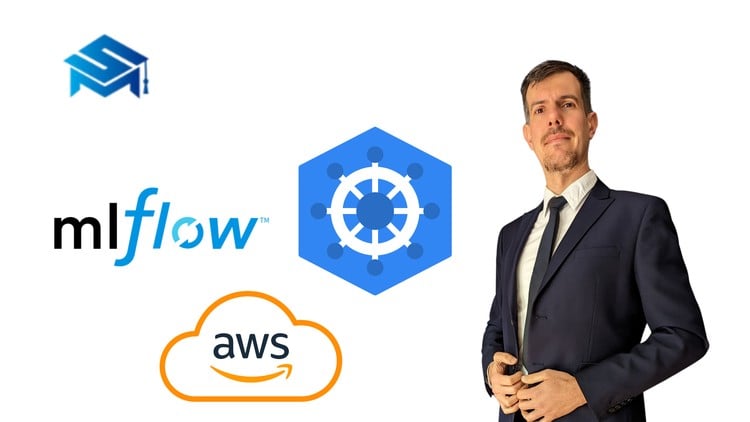In today’s fast-paced AI and data-driven environment, training a machine learning model is no longer the biggest challenge. The real difficulty lies in deploying, managing, and scaling these models in production environments — reliably, securely, and efficiently. That’s where this course, “MLflow & Kubernetes: MLOps for Scalable ML Deployment,” comes in.
This hands-on, practical course provides a comprehensive guide to combining MLflow, the most popular open-source platform for managing the ML lifecycle, with Kubernetes, the industry standard for container orchestration. The result is a scalable, production-grade MLOps solution that you can implement in real-world scenarios across industries and cloud platforms.
MLflow helps manage the complete machine learning lifecycle, including experiment tracking, model packaging, and deployment. It allows teams to version, register, and serve models with minimal configuration. Kubernetes, on the other hand, enables the scalable, containerized infrastructure necessary to run MLflow and other microservices efficiently. By integrating MLflow with Kubernetes, you can automate and manage every part of the ML workflow — from development and testing to deployment and monitoring.
This course teaches you how to deploy and scale MLflow on Kubernetes using modern DevOps and cloud-native tools like Docker, Helm, Kubectl, and persistent storage systems. You’ll learn how to install MLflow Tracking Server and Model Registry inside a Kubernetes cluster, configure it for scalability and durability, and integrate it with your existing machine learning and CI/CD workflows.
You’ll begin by understanding the fundamentals of MLflow and Kubernetes. Then, you’ll walk through the step-by-step process of creating Docker images for your ML projects, using Helm to simplify deployment, and leveraging Kubernetes resources like Ingress, Secrets, Services, and Volumes. You’ll also learn how to set up MLflow for logging experiments, tracking model performance, and managing multiple model versions within a centralized registry.
By the end of the course, you will be able to:
- Deploy MLflow components on Kubernetes clusters using Helm
- Track experiments and metrics in MLflow
- Build Docker containers to support reproducible ML workflows
- Use Kubernetes Services and Ingress to expose MLflow endpoints
- Configure persistent volume storage and secure access with Secrets
- Register, store, and version control your machine learning models
- Automate deployments with CI/CD-friendly infrastructure
You will also gain hands-on experience working with tools commonly used in production, including Minikube for local Kubernetes clusters, Docker for containerization, Helm for deployment management, and Git for version control. You’ll understand how to adapt your deployments to cloud platforms like AWS (EKS), Google Cloud (GKE), or Azure (AKS) without being locked into any one provider.
This course goes beyond the basics and shows you how to implement best practices for ML lifecycle management, including monitoring, model governance, and collaboration within teams. Whether you’re building your own ML platform, transitioning from local development to production systems, or preparing for an MLOps-focused career, this course gives you both the knowledge and hands-on skills to make it happen.
No prior expertise in Kubernetes or MLflow is required. The course is designed for learners who are comfortable with Python, basic command-line tools, and have a general understanding of machine learning workflows. If you’ve worked with Docker, Git, or cloud services before, that will be an advantage, but not a necessity.
This course is particularly useful for:
- Machine Learning Engineers looking to take their models from development to production
- Data Scientists aiming to build scalable ML workflows and manage experiments effectively
- DevOps or MLOps Engineers working to integrate ML into CI/CD pipelines
- Software Engineers interested in ML infrastructure and deployment
- Technical teams developing internal ML platforms
You’ll explore real-world use cases such as managing multiple versions of models, setting up experiment tracking for teams, deploying MLflow APIs through Kubernetes Ingress, and ensuring high availability and fault tolerance in your deployment. Additional sections cover how to monitor MLflow using tools like Prometheus and how to secure your deployment with TLS and Kubernetes secrets.
Learning to combine MLflow with Kubernetes is an in-demand skill across a wide range of industries including finance, healthcare, e-commerce, and SaaS. It will not only help you increase your technical credibility but also make you a valuable asset to any organization implementing MLOps and data science workflows at scale.
This course is project-based and emphasizes applied skills through practical examples and demos. You won’t just watch theory — you’ll build real infrastructure, run your own MLflow server in Kubernetes, and create a foundation that you can expand and deploy in your job or organization.
Upon completion, you’ll have the ability to:
- Set up an ML experiment tracking and model management system
- Package and deploy ML applications in containers using Docker
- Orchestrate deployment with Kubernetes and Helm
- Work with cloud-native components to run ML workloads in production
- Monitor, manage, and optimize the machine learning lifecycle
- Contribute meaningfully to MLOps teams and projects
In summary, if you’re ready to take your machine learning models beyond experimentation and into real-world production systems, this course is the fastest and most practical way to get there. It offers a rare blend of machine learning, DevOps, and cloud-native engineering — the exact skills companies are hiring for today.
Enroll now to start building your expertise in MLflow, Kubernetes, and MLOps — and bring your ML projects to life in production.
Free
If the coupon is not opening, disable Adblock, or try another browser.
If you reach this page after the coupon expired then search the latest coupon here
Tags: udemy coupons 100 off, udemy coupons, udemy coupons 2025, udemy online free courses, Udemy Coupons May 2025
#udemycoupons

